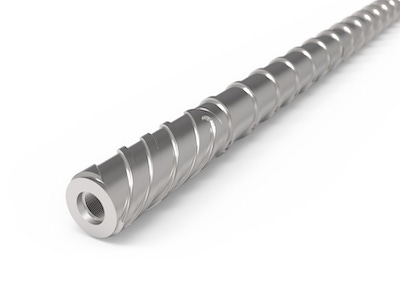A not well-known fact may be that Engel is the world’s largest screw manufacturer in the injection molding industry. At K 2019 Düsseldorf, Germany, the company will be presenting its extensive plasticizing portfolio.
September 4, 2019

|
The LFS for processing long glass fiber-reinforced materials reliably maintains the fiber length and ensures uniform distribution of the fibres in the melt. Picture: Engel |
The screw, non-return valve and barrel massively influence the melt quality and repeatability of the injection molding process as well as the lifespan and cost-effectiveness of the injection molding machine. As a provider of tailor-made, integrated system solutions, Engel also adapts the plasticizing unit to the specific requirements of the respective application.
The requirements placed on plasticizing units are continuing to grow. “This is driven, among other things, by the on-going substitution of traditional technical materials, which generates considerable increases in the performance of polymer materials,” reports Günther Klammer, head of the Plasticising Systems division at Engel. “We ensure that even new materials can be processed even faster and to even higher quality standards despite what are in part increasing stresses on mechanical components.” The keys to this are, on the one hand, continuous investment in new machining technologies and, on the other, splitting the screw portfolio in order to offer the best possible solution for every material execution.
Engel's response to the increasing requirements of the automotive industry in particular, and the increasing use of fibre-reinforced materials, takes the form of two new screws – the PFS (Physical Foaming Screw) and the LFS (Long Glass Fibre Screw).
The PFS was developed specifically for structural foam molding. In conjunction with a new material design, the new screw geometry ensures even better homogenisation of the gas-loaded melt and increases both productivity and the screw service life wherever fibre-reinforced polymers are used. A victory injection molding machine equipped with the new PFS will produce highly decorated, three-dimensionally complex parts at Engel's stand during K 2019. The application combines MuCell structural foam molding from Trexel with the roll-to-roll in-mold decoration (IMD) process.
Long glass-fiber reinforced polypropylene and polyamide are commonly used for lightweight automotive construction – above all when high impact strength, excellent impact behaviour and low weight are required. The processing challenge in injection molding is to keep the fiber as long as possible and ensure uniform distribution of the fibers in the melt.
The previous solution was a single flighted 3-zone screw with a bolt-on long glass-fiber (LGF) mixing head. With the demand for injection molding machines for processing long glass fiber-reinforced plastic in rod granule form on the rise, Engel decided to manufacture the screw and mixing head from a single piece and to further optimise the screw geometry. The newly developed LFS offers maximum plasticizing consistency when processing rod granules and reduces fiber breakage. In order to ensure superior distribution of the fiber bundles in the product, the screw geometry was also optimised. Highly effective flight-welding gives the screw the required wear- and corrosion-resistance.
About the Author(s)
You May Also Like





